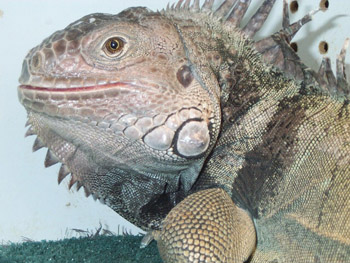Iguana Care
The common green iguana, scientifically known as Iguana iguana, is a reptile pet imported from South or Central America or raised in captivity. Iguanas are the most popular lizards for people to have as pets. Unfortunately, they tend to be a pet bought on impulse. Consequently, owners often do not understand the needs of their pet.

It’s important to have these pets examined by a veterinarian, since many have been bought on impulse, improperly fed, and have been put in an inappropriate environment. Each reptile has requirements for moisture, temperature, hibernation, and diet. Owning any reptile requires work. You can’t just buy it, throw it in a cage, and think it’s fine. Serious pet owners research their potential pet and find out its requirements.
One factor people forget is that iguanas grow continuously. In the wild, iguanas live 10 to 15 years and can grow as large as seven-feet long. If cared for properly, reptiles in captivity can live up to 20 years. Many people don’t realize the commitment when they buy this little cute thing and put it in a ten-gallon tank.
You should get a cage that is at least two times the length of the reptile, measuring from its nose to its tail. You’ll want your pet to have room to move up and down. You’ll also want to have branches for climbing. Since the cage should be cleaned out daily, newspaper or butcher paper can be used as flooring. Using corncobs and wood chips is not a good idea. Your iguana may eat these and get an obstruction of the gut.
Iguanas are herbivores. Up to 90 percent of an iguana’s diet should consist of dark leafy green vegetables. Avoid too much spinach or broccoli because they can reduce calcium absorption. If you feed meat or too much protein in the diet, renal (kidney) failure can occur. Some lizards are omnivorous (e.g., bearded dragons) or even completely carnivorous (e.g., monitors), so research your lizard’s diet before feeding.
When you buy your iguana, have it tested for parasites. Many iguanas die from parasitism. When purchased, many iguanas have coccidia. A sick lizard often stops eating, drinking, and moving around. Skin disease and metabolic bone disease are very common ailments. One problem owners sometimes encounter is aggressiveness. Male iguanas especially become more aggressive as they get older. Some males will get pretty vicious. Their small, very sharp teeth almost feel like razors when you are bitten.

To prevent the problem of aggression, it’s recommended to have your pet spayed or neutered at an early age. If you have a female iguana, an early spay can also prevent egg binding. Female iguanas lay eggs at specific times of the year. If the female does not have an appropriate nesting area or appropriate humidity, she may retain her eggs. Egg retention is a serious condition and often requires surgery in order to remove the non-laid eggs.
In their native environment, iguanas rest at night and begin the hunt for tender shoots, flowers, and soft fruits after basking in the sun for a few hours in the morning. After eating, they bask in sun again to stay warm enough to digest their food. Be sure to provide your iguana with a source of ultraviolet light and the appropriate amount of heat. Keep a thermometer available to monitor the temperature.
Iguanas are prey species; therefore, a good deal of the day is spent keeping a look out for predators. Initially your iguana will be protecting itself from you (you are the predator). Socializing your iguana is a time-consuming but necessary process to ensure your pet’s longevity. Many people end up getting rid of their iguana when it expresses its natural aggressive behavior towards the predator—namely us. However, with time and socialization, your iguana will relax and become a happy safe pet.
Remember that most health problems in reptiles are related to inappropriate diet, environment, and husbandry. Take time to socialize your pet, give it a proper diet and environment, and it will provide you will years of fun and satisfaction.
[ Search Articles ] [ Article Index ]
